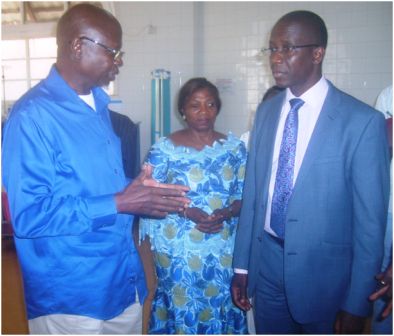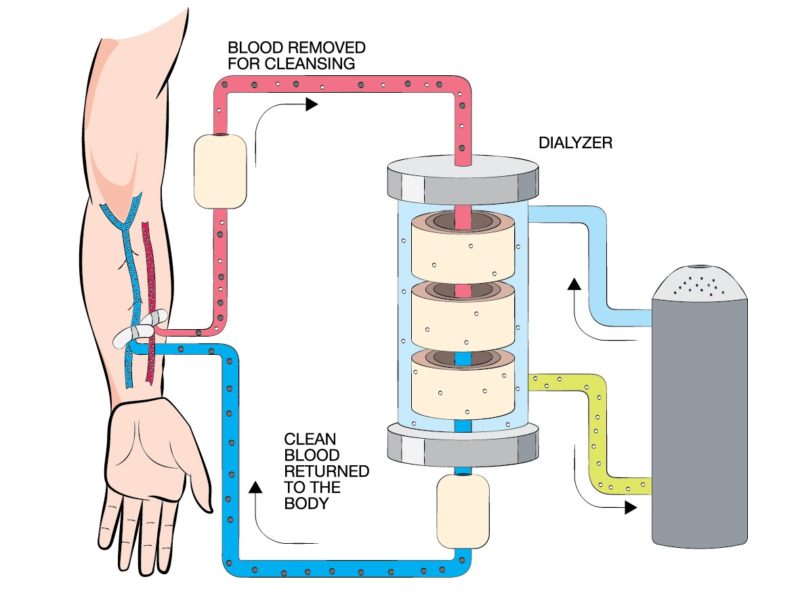Connaught Hospital Dialysis Unit in Sierra Leone
“A Dream coming into reality”- Health Minister Dr. Abu Bakarr Fofanah, poised to actualize First Lady’s Vision.
In the fight to rebrand the health system to an acceptable standard for the Sierra Leone setting, Health and Sanitation Minister Dr. Abu Bakarr Fofanah on Wednesday February 4, 2015 made an assessment tour of the Connaught Hospital Dialysis Unit to reactivate the vision of the First Lady in getting a functional Dialysis Unit in Sierra Leone that would ease the problem of overseas treatment for Hemodialysis and Kidney disease.
The Connaught Dialysis Unit, the baby of the First Lady was initiated in 2012, equipped and donated by the Ministry of Foreign Affairs of Israel and its people at a ceremony held at the Connaught Hospital in February 2012. Since then the Unit lack the capacity to run in full operation which Dr. Abu Bakarr Fofanah has taken the challenge to champion with a view to achieving the desired goal of the First Lady, Madam Sia Nyama Koroma.
Addressing staff of the Unit, including Senior Physician Specialists of the Hospital, Dr. Fofanah reiterated the First Lady’s compassion, care and love for Sierra Leoneans describing her diplomatic contribution as modest and patriotic “I am very excited by the First Lady’s dream, and poised to bring it into reality”, maintained Dr. Fofanah
Post graduate Medical Study and Training is a Flagship Project in the Health Ministry and the Minister’s Vision 2015-2016/2016-2020 on building a resilient health system for Sierra Leone, captures the involvement of the Ghana College of Physicians to actualize accreditation for Post graduate studies. There are Short, Medium and Long term Plans for the construction of an ultra-modem Teaching hospital at Kerry Town and the expansion of Connaught hospital to Jui as part of the minister’s vision in making Connaught a Center of Excellence.
Twenty personnel have already been trained by the Consultant Biomedical Engineer, and have demonstrated commitment to fulfill the dream of the First Lady with the inspired enthusiasm seen in the minister’s move towards the reopening of the unit. ready to receive a specialist from Israel in February this year to capacitate the staff with a view to strengthen output as well as effective and efficient service delivery during his 12 months stay in the country. The Minister is poised to compliment the First Lady’s effort with the required speed to achieve success in the entire process by getting the unit functional between February and March this year.
“I have no doubt in the team put together and very optimistic that with the continued support from the First Lady Madam Sia Nyama Koroma and the minister Dr. Abu Bakarr Fofanah, the desired goal will be achieved”, opined one of the Physician Specialist at Connaught. ”Considering the framework within the Agenda for prosperity, destitute who cannot afford the cost for treatment, their concern will be addressed in partnership with the Ministry of Social Welfare Gender and Children’s Affairs”. The minister told his audience.
Highlights of the minister’s visit include contributions by the Dialysis Consultant, Mrs. Nyama Fatmata Kamara, Nephrologist and former Health Minister, Dr. Soccoh Kabia, and Senior Physician specialists Dr. Fadlu- Deen and Russel. The Biomedical Engineer, Alusine Bobson Kabia and the Policy Adviser, Office of the First Lady, Mr. Sam Bangura also made meaningful contributions during the conducted tour of the various facilities in the Unit.
Some Facts About Hemodialysis/Kidney Disease
What is Hemodialysis?
Hemodialysis is when the blood circulates outside the body of the patient, goes through a machine that has special filters. The blood comes out of the patient through a catheter (a flexible tube) that is inserted into the vein.
The filters do what the kidney do; they filter out the waste product from the blood. The filtered blood then returns to the patient via another catheter. The patient is in effect connected to a kind of artificial kidney.
The Patient need to be prepared for hemodialysis that is … A blood vessel, usually in the arm, needs to be enlarged. Surgery is required for this. The enlarged vein makes the insertion of the catheter possible.
Causes of Kidney Disease:
Diabetes – thought to cause about fifty percent (50%) of all cases.
- Hypertension (high blood pressure)…….thought to cause twenty-five (25%) of all cases.
- Inflammation of the Kidney (glomerulonephritis)
- Malaria
- Systemic Lupus…..when the body’s own immune system attacks the kidney
- Polycystic kidney disease……….inherited
- Physical Injury……such as a heavy blow to the kidney.
- Kidney Infection
- Over Consumption of some Medications
- Yellow fever.
Symptoms of Kidney Disease:
- Fatigue (tiredness)
- Frequent need to urinate especially at night (frequency grows with time)
- Itchy skin
- Erectile dysfunction (men have difficulty getting and / or sustaining an erection)
- Nausea
- Shortness of breath
- Water retention (Swollen feet, hand and ankles)
- Blood in urine
- Protein in Urine
- A sudden injury can cause kidney failure
- Anemia……..90% of people with kidney disease are affected
Dialysis and Kidney Disease
What do the Kidneys do?
The kidneys excrete “waste”: By filtering the blood constantly, the body’s EXCESS waste products, toxins, water and minerals are made into urine and passed out the body through the kidneys. This maintains the right balance of nutrients in the body to stay healthy
Dialysis: Is the artificial process of eliminating waste (diffusion) and unwanted water (Ultra Filtration) from the blood. Our kidneys do this naturally, but for some people, however, may have failed or damaged kidneys which cannot carry out the functions properly. THEY NEED DIALYSIS. In other words dialysis is the artificial replacement for lost kidney function (Renal Replacement Therapy).
Acute Kidney Failure (ARF): Is the sudden and temporary loss of kidney function that is usually reversible.
Chronic Kidney Disease (CKD): Is a slow, progressive, permanent loss of kidney function,. For healthy person our kidney regulates our body levels of water and minerals, and removes waste.
Why Is Dialysis Necessary?
Approximately 1,500 liters of blood are filtered each day. We could not live if waste product were not removed from our kidneys. People whose kidneys either do not work properly or not at all experience a build-up of waste in their blood. Without medical intervention, poor health and even death may occur.
CREDIT Dialysis Consultant, NYAMA F. Kamara.
Stay with Sierra Express Media, for your trusted place in news!
© 2015, https:. All rights reserved.








